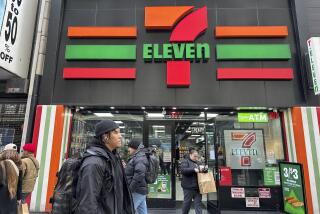Potential Bid for Karcher Is Reviewed : Fast food: Anaheim-based parent of Carl’s Jr. chain may return to private ownership, but no offers have been received.
- Share via
ANAHEIM — A Wall Street investment bank has been hired by outside directors of Carl Karcher Enterprises to review a potential bid by Chairman Carl N. Karcher to return the fast-food chain to private ownership.
The investment firm, identified as Lehman Bros. by a stockbroker close to the corporation, is also contacting potential buyers. So far, no offers have been received for Karcher, the parent firm of the Carl’s Jr. hamburger chain.
The flurry of activity was prompted by the announcement last month by Karcher that he is holding discussions with an unidentified investment group interested in buying the Anaheim-based company and making it private again. But the announcement said the group would not be interested if the stock price went above $10 a share.
Consequently, the stock price zoomed from about $8 a share to the $10 range immediately following the announcement and remained there. Analysts, however, say the company’s value is $14 or $16 a share because of untapped potential under its current management.
Shares of Carl Karcher Enterprises closed Monday at $9.88, up 13 cents.
“I think it’s an under-performer because it needs a new management team,” said Doug Christopher, an analyst for the brokerage of Crowell, Weedon & Co. in Los Angeles.
To ensure the best deal for shareholders, outside members of the board formed a special committee to review possible bids. Committee members include Peter Churm, chairman emeritus of the Furon Co.; Kenneth Olsen, retired chairman of Vons Cos. Inc.; Elizabeth A. Sanders, a management consultant and a former executive with Nordstrom department stores, and Daniel W. Holden, executive vice president of Monnig Development Inc.
“The objective of the committee is to represent shareholders and get the best deal possible” if an offer comes in, said Churm, who chairs the committee.
Bill Davenport, a stockbroker for Kidder, Peabody & Co. in Newport Beach, said he thinks an offer could come in the next two weeks. “That’s the impression I have. They are expecting something shortly,” he said.
But Loren Pannier, Karcher’s chief financial officer, said that any information about an offer is “pure speculation.”
Mergers & Corporate Policy, a weekly newsletter published by Securities Data Co. in New York, said in Monday’s edition that Karcher himself was spearheading the investment group’s efforts. Some, however, raise questions about how sincere the founder may be.
Karcher is 75 and has no family members who have stepped forth to take over the company. Reached last month for a comment about a possible deal, Karcher declined comment but noted that he has had difficult days since the death of his brother Donald, the company president, earlier this year.
Although the company said it has been conducting a search for a replacement, it has not selected one. The company had earlier fired its executive vice president and has also not replaced him. The result, observers say, is a gap in leadership that enhances the possibility that Karcher may be fishing for a buyer.
A buyer could handle the business operation, leaving Karcher with time to do what he enjoys most--greeting customers and enjoying his fame. For example, the late Col. Harland Sanders, served as a “goodwill ambassador” for years after selling Kentucky Fried Chicken.
A recent report by the stock brokerage of Cyrus J. Lawrence Inc. in New York mentions Wendy’s International as a possible buyer, but the firm is reportedly troubled that Karcher leases rather than owns many of its key restaurant locations. Wendy’s International officials could not be reached for comment.
Carl Karcher Enterprises could be a tough sell, however. Though the chain has had more than 640 restaurants and has been growing fast lately, it has been hamstrung by a strategy that until recently has run against the grain of rampant discounting in the industry.
“There are two views,” said Crowell Weedon’s Christopher. “Who would want a high-cost, high-priced hamburger stand in Southern California with a crappy economy? The other view is they have nice locations, good food and a good atmosphere.”
More to Read
Inside the business of entertainment
The Wide Shot brings you news, analysis and insights on everything from streaming wars to production — and what it all means for the future.
You may occasionally receive promotional content from the Los Angeles Times.










